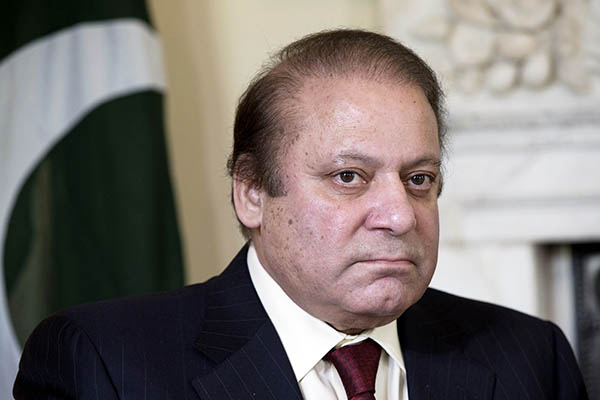
Oli Scarff—AFP
Prime minister plays down row with U.A.E. minister, claiming Islamabad’s solidarity with Gulf states remains unchanged.
Islamabad will “intensify” efforts to find a diplomatic solution to the Yemen conflict, Prime Minister Nawaz Sharif said on Monday, after Parliament voted to keep the country out of the Saudi-led coalition against anti-government rebels.
Nawaz Sharif said the restoration of Yemeni President Abedrabbo Mansour Hadi’s government, overthrown by Shia Houthi rebels, would be an “important step forward towards establishing peace.”
Parliament on Friday unanimously voted to remain neutral in the Yemen conflict, rebuffing long-term ally Riyadh’s request for troops, warplanes and ships.
U.N. chief Ban Ki-moon says more than 600 people have been killed since the Saudi-led coalition began airstrikes against the rebels on March 26. Pakistan has pushed efforts to find a negotiated end to the fighting, holding talks last week with Iranian and Turkish officials to pursue this.
“Pakistan will intensify its diplomatic efforts in the coming days, in consultation with the leadership of Saudi Arabia, to resolve the crisis,” Sharif said in a statement delivered to television cameras.
Saudi Arabia accuses Tehran, the major Shia power, of backing the rebels and has vowed to bomb the fighters to pressure them to surrender and prevent a pro-Iran state setting up on its doorstep.
Iranian Foreign Minister Mohammed Javad Zarif visited Islamabad for talks last week and Sharif said he warned him that the overthrow of Hadi’s “legitimate government in Yemen… had set a dangerous precedent that was fraught with serious risks for the entire region.”
Sharif, who is personally close to the Saudi royal family after they sheltered him following his 1999 overthrow, repeated earlier assurances that Pakistan stood ready to defend the oil-rich kingdom’s territorial integrity. He also sought to play down a row with the United Arab Emirates that blew up over the weekend after the Gulf state’s foreign minister slammed the parliamentary resolution as “contradictory and dangerous and unexpected” and accused Islamabad of siding with Iran.
Sharif said Pakistan’s solidarity with Gulf states was not in doubt and the row was the result of “an apparent misinterpretation” of the resolution.
Islamabad has found itself in an awkward position on Yemen. It has deep military and religious ties to Saudi Arabia and has long benefited from the kingdom’s largesse. But it has been reluctant to become ensnared in a conflict that carries sectarian overtones, with violence against minority Shias on the rise at home in recent years.
